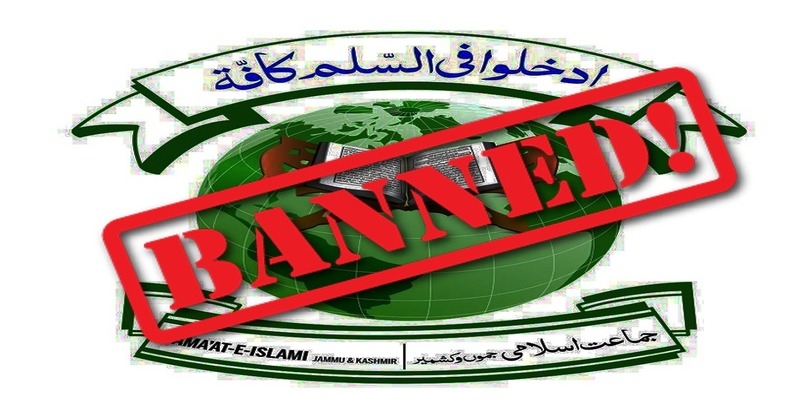The Government of India banned Jamaat-e-Islami Jammu and Kashmir (JIJK), a separatist organization, for five years because it seeks religious routes to subvert democratic and secular fabric of Jammu and Kashmir (J&K) and India. JIJK is consistently making efforts to separate J&K from India and merge it with Pakistan. Hence, the ban was imposed on it because of its anti-national and subversive activities. The ban was imposed amid growing tension between India and Pakistan, after Pulwama attack, in which more than 40 CRPF soldiers were martyred. The Government of India found that JIJK “has been indulging in activities which are prejudicial to internal security and public order, and have the potential of disrupting the unity and integrity of the country.” This separatist organization was banned under Section 3 of the Unlawful Activities (Prevention) Act, 1967. The organization is involved in anti-national and subversive activities in the country and is in close connection with terrorists that would have further escalated the problem of terrorism in India if the Government would not have swung into action. As per the order passed by the Ministry of Home Affairs, “central government is of the opinion that JIJK is in touch with terrorist outfits, and is supporting extremism and terrorism in Jammu and Kashmir, and elsewhere. With the banning of Jammat-e-Islami, the number of organisations banned under UAPA now stands at 42.

About JIJK
JIJK was formed in 1945 as a chapter of the Jamaat-e-Islami Hind and separated in 1953 due to differences over political ideology with the parent body. The formal unit of JIJK was formed in 1947 in the form of a library (Darul Muta'la) at Nawab Bazar, Srinagar and Moulana Saad-ud-Din was elected as its first head. After partition, the Jama’at unit in Srinagar continued to work under the supervision of Moulana Saad-ud-Din. Being a Government Headmaster, Maulana introduced many people mostly his colleagues and students to this Islamic Movement. According to JIJK, Islam is a complete way of life, devoid of nationalism, socialism, liberalism or any other non-Islamic ideologies. Jamia Masjid in Srinagar became the location of Jamaat's weekly meetings and its activists, based in Srinagar, favoured the state to join Pakistan. It was successful in attracting gullible and less educated Kashmiri youth for its nefarious activities in Kashmir that were entirely based on the notion that only Islam is the way of life and it should be the religion of the State. JIJK established number of schools between 1947 and 1952 and expanded its activities in the media and the mosques. Their overt targets were Hindus, as JIJK was scared that Muslims would accustom to Hindu culture and faith. This could be found in its warning to its colleagues in Kashmir that Jammu Muslims needed to be helped otherwise they could be Hinduised in terms of culture and faith. It was also having the apprehensions that secularism is dangerous and hence, remaining with India will not serve its purpose of communalism.

Failed election venture of JIJK
JIJK participated in the 1971 general elections and 1972 elections to the State Assembly. But it could not manage to win even a single seat in 1971 whereas in 1972 it won only 5 seats because of its overt agenda of Islamization of Kashmir. The group won only one seat in 1977 election. In April 1979 General Zia ul Haq seized power and hanged Zulfiqar Ali Bhutto and the Jamaat-e-Islami of Pakistan was behind this event. In 1983 JIJK failed to win even a single seat though it contested on 26 seats. In 1988, JIJK floated Falah-e-Aam Trust to run its Islamisation agenda. In 1989 Hizbul Mujahideen (HM) was adopted as the group's "militant wing" allegedly under the influence of Pakistan's Inter-Services Intelligence. In 1990 a chief commander of HM pronounced HM the "sword arm of the Jammat". In 1998, JIJK re-opened its HQ at Baranpather, Batamaloo in Srinagar after Ghulam Mohd Bhat was elected its Chairman.
Bloodshed by JIJK
JIJK is different from Jamaat-e-Islami Hind, its Indian counterpart, and backs Jamaat-e-Islami Pakistan. JIJK used the pretext of rigged in 1987 to overthrow the secular and democratic structures from Kashmir by using the AK-47 guns and to establish the Islamic rule. Increasing presence of Kashmiri Hindus in government services also used as fodder to instigate communal tension during the 1990s by this terrorist outfit. JIJK was involved in the terrorism of 1990s, in which its terrorists were killing the innocent people in Kashmir. By 1990s Pakistan overtly supported JIJK and other terrorist groups who were pro-Pakistan. In 1989, when terrorism was at its peak in Kashmir, the region's largest terrorist outfit, Hizbul Mujahideen, declared it was JIJK's terrorist wing. JIJK supports terrorism and separatism in Kashmir valley. One of the dreadful terrorists turned separatist Syed Ali Shah Geelani was also associated with this organization. JIJK could not sustain in Jammu because it did not have a cadre base there and its operations were largely restricted to Kashmir. Since most of the Muslims of Kashmir were not educated, JIJK established various schools across Kashmir that teaches only Islamic fundamentalism and helped in spreading the message of JIJK. This vast network of JIJK catalyzed in bringing terrorism in the state. The stated political and social objective of JIJK is to establish Islamic rule and merge Kashmir with Pakistan and for this purpose the organization even resorts to blood shedding. Even its 5 members in the state assembly in 1972 demanded implementation of Islamic rule. JIJK was an influential founder member of the undivided Hurriyat Conference from its inception in 1993. Though it is said that JIJK separated from Hurriyat Conference in 2003 yet the similar objectives of both create doubts about it. JIJK was banned by the Indian Government in the aftermath of 1990s terrorism and this ban lapsed in 1995. With intense counter-terrorism operation of India, JIJK could not overtly continue terrorism and shifted its tactics from terrorism to spreading misinformation.

The party, with pro-Pakistan leaning during the Plebiscite Front days and also during the eruption of terrorism, pitches itself as a socio-religious organisation. Even today the stated objective JIJK was to carve out an Islamic state out of the Union of India by destabilising the government established law. It is using two-fold strategies for this purpose- spread misinformation and support to terrorism. Hence, it was essential that the Government of India should curb its activities and today’s crackdown on it was very much needed, especially when India is fighting against the worst form of terrorism.




